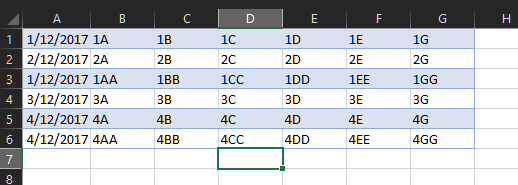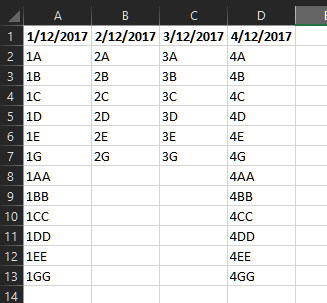[ad_1]
This is not so straightforward a problem because of having to consolidate the information by date.
You also do not indicate what you want to happen should there be more than one identical code associated with a particular date. I chose to ignore it, and only list the unique codes, but you can modify the code below to do something else, if you need.
Simplified algorithm:
- Read the data into a VBA array (for speed of processing)
- Create User Defined Objects (class) with properties of:
- the relevant date
- a collection (dictionary) of all the codes associated with that date
- Collect these objects into another dictionary with the
Keybeing the relevant date - Reorder the information into a “Results” array
- output to the worksheet and format.
Read the notes in the code, as they are quite important
Class Module
'**Rename this Module: cByDates**
Option Explicit
Private pDt As Date
Private pCode As String
Private pCodes As Dictionary
Public Property Get Dt() As Date
Dt = pDt
End Property
Public Property Let Dt(Value As Date)
pDt = Value
End Property
Public Property Get Code() As String
Code = pCode
End Property
Public Property Let Code(Value As String)
pCode = Value
End Property
Public Property Get Codes() As Dictionary
Set Codes = pCodes
End Property
Public Function addCodesItem(Value)
'bypass any duplicates
If Not Codes.Exists(Value) Then _
Codes.Add Value, Value
End Function
Private Sub Class_Initialize()
Set pCodes = New Dictionary
pCodes.CompareMode = TextCompare
End Sub
Regular Module
'Set Reference to Microsoft Scripting Runtime
Option Explicit
Sub ConsolidateByDate()
Dim wsSrc As Worksheet, wsRes As Worksheet, rRes As Range
Dim vSrc As Variant, vRes As Variant
Dim cBD As cByDates, dBD As Dictionary
Dim I As Long, J As Long
Dim lRC() As Long 'last row-col
Dim V As Variant, W As Variant
'Setup worksheets and results range
Set wsSrc = Worksheets("sheet1")
Set wsRes = Worksheets("sheet2")
Set rRes = wsRes.Cells(1, 1)
'read original data into VBA array for speed of processing
'if there is or will be other information on Sheet1, then you will need a
' different routine to find the last row and column
With wsSrc
lRC = LastRowCol(.Name)
vSrc = .Range(.Cells(1, 1), .Cells(lRC(0), lRC(1)))
End With
'Collect and organize the data
Set dBD = New Dictionary
For I = 1 To UBound(vSrc, 1)
For J = 2 To UBound(vSrc, 2)
Set cBD = New cByDates
With cBD
.Dt = vSrc(I, 1)
.Code = vSrc(I, J)
.addCodesItem .Code
If Not dBD.Exists(.Dt) Then
dBD.Add Key:=.Dt, Item:=cBD
Else
dBD(.Dt).addCodesItem .Code
End If
End With
Next J
Next I
'Create results array
'number of columns = number of dBD items
lRC(0) = 0
lRC(1) = dBD.Count
'number of rows = max codes count
For Each V In dBD.Keys
lRC(0) = IIf(lRC(0) > dBD(V).Codes.Count, lRC(0), dBD(V).Codes.Count)
Next V
ReDim vRes(0 To lRC(0), 1 To lRC(1))
'Populate each column
J = 1
For Each V In dBD.Keys
I = 0
vRes(I, J) = V
For Each W In dBD(V).Codes.Keys
I = I + 1
vRes(I, J) = W
Next W
J = J + 1
Next V
Set rRes = rRes.Resize(UBound(vRes, 1) + 1, UBound(vRes, 2))
With rRes
.EntireColumn.Clear
.Value = vRes
With .Rows(1)
.Font.Bold = True
.HorizontalAlignment = xlCenter
End With
.EntireColumn.AutoFit
End With
End Sub
'------------------------------------------------------
Function LastRowCol(Worksht As String) As Long()
Dim WS As Worksheet, R As Range
Dim LastRow As Long, LastCol As Long
Dim L(1) As Long
Set WS = Worksheets(Worksht)
With WS
Set R = .Cells.Find(what:="*", after:=.Cells(1, 1), _
LookIn:=xlValues, searchorder:=xlByRows, _
searchdirection:=xlPrevious)
If Not R Is Nothing Then
LastRow = R.Row
LastCol = .Cells.Find(what:="*", after:=.Cells(1, 1), _
LookIn:=xlValues, searchorder:=xlByColumns, _
searchdirection:=xlPrevious).Column
Else
LastRow = 1
LastCol = 1
End If
End With
L(0) = LastRow
L(1) = LastCol
LastRowCol = L
End Function
Original Data
Results
I try to avoid references to non-SO information, but I will make an exception here. For a basic discussion of Classes, see Chip Pearson’s Introduction to Classes
4
[ad_2]
solved Transpose Column into Row with VBA [closed]

